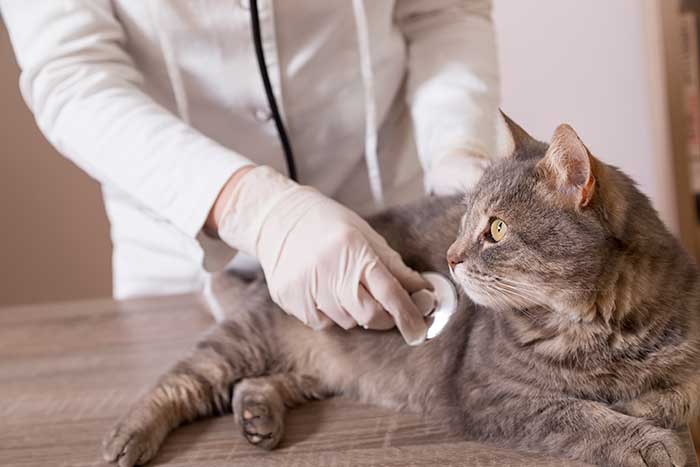Heartworm Prevention
Heartworm Prevention in Campbell and Saratoga Animal Hospital
Heartworms are transmitted by more than 70 species of mosquito. Heartworms are spread through mosquito bites carrying infective heartworm larvae. Virtually 100% of dogs exposed to the heartworm larva will become infected. In dogs, the larvae migrate from the spot the mosquito has bitten and travels through the body until they reach the heart and blood vessels of the lungs. The larvae mature and reproduce, releasing immature heartworms, known as microfilaria into the animal’s blood.
Heartworms in cats have a much shorter lifespan as cats have smaller and fewer heartworms present. In cats finding microfilaria in the blood is uncommon which is why blood tests are not given routinely before getting the medication. There is no effective treatment in cats to kill heartworms. This is why prevention is the best course for cats and dogs. Treating your dog for heartworm infection can be a severe medical risk. Prevention in both dogs and cats is our primary goal. The expense of treatment far outweighs the cost of prevention.

Signs of Heartworms in Your Dog
In the early stages, heartworm disease may not cause any symptoms. As it progresses, one of the first signs could be a mild cough. Although a cough may not seem problematic at first, it will persist and may worsen over time as the disease progresses., so be alert for a persistent, nagging cough in your dog.
Heartworms frequently cause dogs to become intolerant to exercise. You may notice that your previously active dog begins to slow down on walks or not run to the door when you grab the leash anymore. In more severe cases, your dog’s resistance to exercise may become dramatic, causing them to stop almost all of their activities. This exercise intolerance is likely to be accompanied by breathing difficulties when your dog does attempt to be active.
Bloody or darkly colored urine, alongside pale gums and labored breathing, indicates a serious complication of heartworm disease called caval syndrome. Caval syndrome occurs when the heartworms cause a blockage of blood flow in the heart, which in turn leads to cardiac collapse. Emergency treatment at your animal hospital is crucial to remove the blockage and restore proper blood flow. Failure to do so could result in loss of life.

Signs of Heartworm Disease in Cats
Heartworm in cats is much more difficult to diagnose. Cats symptoms can be very subtle or very dramatic. Symptoms may include coughing, asthma-like attacks, periodic vomiting, lack of appetite, or weight loss. More serious symptoms include difficulty walking, fainting spells or seizures, or suffer from fluid accumulation in the abdomen. Since there is no known cure for heartworms in cat’s prevention is extremely important.
Treatment of Heart Worms in Dogs
If your dog is diagnosed with heartworm disease, a course of action may involve antibiotics, heartworm preventives, and steroids before beginning the actual adult worm treatment. This is due to bacteria that may have built up from dead heartworms called Wolbachia.
Since the heartworm treatment only kills adult worms, veterinarians may prescribe a monthly heartworm preventive to kill the smaller larvae before initiating adult heartworm treatment. The administration of corticosteroids at the same time as the antibiotics and heartworm preventive also helps reduce inflammation.
Once your dog has completed the course of steroids, heartworm preventive and antibiotics, he should be ready to start the actual adult heartworm treatment. The treatment consists of a series of drug injections to kill the worms. The dog will be monitored after the injection to make sure that no reaction happens. It takes about 60 days to complete the treatment.
A test after treatment and six months later is recommended to ensure that all of the larvae, microfilariae and adult worms are dead. If found positive still a second treatment may be needed.
In most cases, drug treatment for dogs with heartworm disease is usually successful especially if it is caught early enough. In extreme cases, the worms are found not only in the heart but also in a caudal vena cava, a large vein located between the liver and the heart and may require surgical removal of worms.
Confinement in a crate to limit activity during treatment and for several weeks afterward may be advised. The blood flow from activity can be blocked by fragments of dead worms causing capillaries to rupture as the body tries to pump blood through the blocked arteries causes more complication or sudden death.
Prevention
The best cure of all is prevention. Heartworms can be prevented with monthly medication. The first step is to get a blood test for your dog yearly to make sure they do not have heartworm. After the negative test, we can recommend the best kind of prevention and a proper dose of heartworm preventive medicine. Outdoor cats should be placed on monthly doses but do not require the blood test. Our Vets will suggest the right Heartworm medicine and dosage for your pet.
You can visit Dr. Reed’s online store to get refills for easy in-home delivery.
We Treat Your Pet as if They Were Our Own
